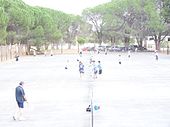Tintinara, South Australia
| Tintinara South Australia | |||||||||||||||
|---|---|---|---|---|---|---|---|---|---|---|---|---|---|---|---|
| Coordinates | 35°53′0″S 140°03′0″E / 35.88333°S 140.05000°E | ||||||||||||||
| Population | 277 (UCL 2021)[1] | ||||||||||||||
| Established | 1850s | ||||||||||||||
| Postcode(s) | 5266 | ||||||||||||||
| Elevation | 20 m (66 ft) | ||||||||||||||
| Location | 190 km (118 mi) SE of Adelaide | ||||||||||||||
| LGA(s) | The Coorong District Council | ||||||||||||||
| State electorate(s) | MacKillop | ||||||||||||||
| Federal division(s) | Barker | ||||||||||||||
| |||||||||||||||
| Footnotes | Adjoining localities[2] | ||||||||||||||
Tintinara is a town located in the Murray and Mallee region[3] of the South East of South Australia.
The town is situated on the Dukes Highway and the Adelaide-Melbourne railway line. It is in The Coorong District Council local government area, the South Australian House of Assembly Electoral district of MacKillop and the Australian House of Representatives Division of Barker. At the 2016 Australian census, the town and district had a population of 527.[4]
The origin of the name has been debated. One possibility is that a local Aboriginal man was named Tin-Tin, and the 'ara' was appended to form the place name, or that one of the Boothbys' Aboriginal employees was named Tintinara.[5][6] Geoff Manning suggests that the name may have derived from an Aboriginal word, tinlinyara, the stars in Orion's belt.[7]
History
[edit]The area was first settled by Europeans in the 1840s when graziers moved their flocks of sheep into the district. Shortly afterwards the 'Tintinara' homestead was erected by the brothers T. W. Boothby and J. H. Boothby, who held a lease of 165 sq.miles here. In 1865 the new owners, William Harding and George Bunn, built a 16-stand shearing shed which is now classified by the National Trust, along with the homestead.[8]
The Tintinara wells and Reedy Wells were regular watering points for Tolmer's gold escort team. Tintinara post office was opened in the 1860s.[9]
Tintinara is situated in what was an unproductive region because of its poor sandy soils, and low mallee scrub and heath vegetation. After clearing of some of this vegetation, and the addition of trace elements, the district has become a productive farming area.[9] One of the main environmental areas that Tintinara has is Lake Indawarra.[9]
Community organisations
[edit]
Generally
[edit]Tintinara has many different community organisations including the Tintinara Action Club and Tintinara Lions Club as well as many different facilities including:
- Tintinara Cricket Club
- Border Downs Tintinara Football & Netball Club
- Tintinara Bowling Club
- Tintinara Golf Club
- Tintinara Tennis Club
Tintinara Tennis Club
[edit]The Tintinara Tennis Club was established in 1919 by Edward B. Northcott and Fanny and Tilly Williams. There were approximately 40 members when the club formed. The facilities consisted of two courts that were used for many years, then in the summer of 1951–52 games started on four new courts. Since then more courts have been added and a new clubhouse was completed in 1966.[10] Currently the club has 6 courts and a clubhouse.
References
[edit]- ^ Australian Bureau of Statistics (28 June 2022). "Tintinara (urban centre and locality)". Australian Census 2021.
- ^ "Search result for "Tintinara (Locality Bounded)" (Record no SA0035206) with the following layers selected – "Suburbs and Localities" and "Government Towns"". Department of Planning, Transport and Infrastructure. Retrieved 9 April 2016.
- ^ "Limestone Coast, South Australian Government Region" (PDF). The Department of Planning, Transport and Infrastructure. Retrieved 1 December 2018.
- ^ "2016 Census QuickStats: Tintinara". quickstats.censusdata.abs.gov.au. Retrieved 8 August 2019.
- ^ Day, Alfred N (1915). Names of South Australian Railway Stations with Their Meanings and Derivations (PDF). Adelaide: South Australian Railways [R E E Rogers, Government Printer]. p. 28.
- ^ "Steam Applied to Agriculture". The Advertiser. Adelaide. 2 October 1905. p. 6. Retrieved 5 July 2015 – via National Library of Australia.
- ^ Geoff Manning. "Place Names of South Australia: Tintinara". State Library of South Australia. Retrieved 14 May 2022.
- ^ "Tintinara Tourist Information". TRADE Inc. Retrieved 24 May 2011.
- ^ a b c Reader's Digest Illustrated Guide to Australian Places. Sydney: Reader's Digest. 1993. p. 502. ISBN 0-86438-399-1.
- ^ Twelftree, Pat (1974) The History of Tintinara and District, Coudrey Offset Press Pty. Ltd., pg.44

